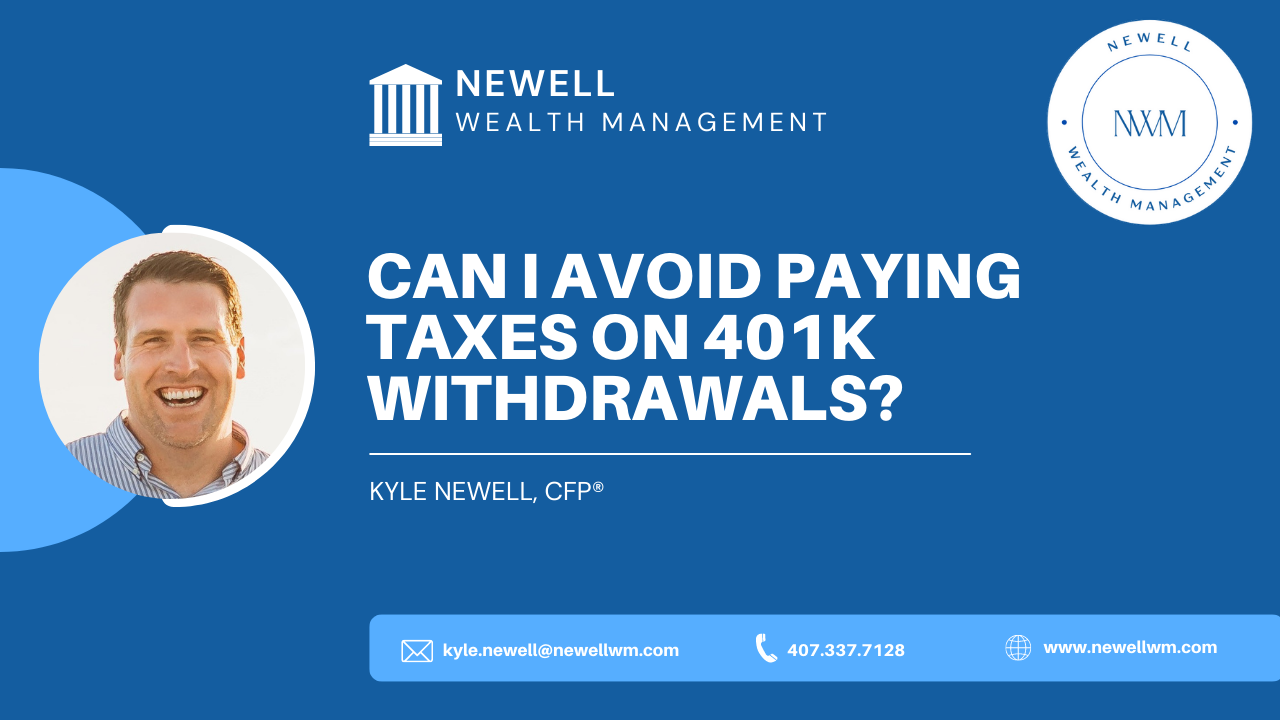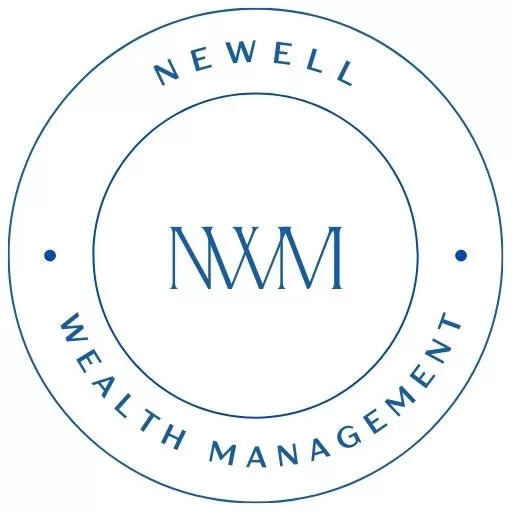Can I Avoid Paying Taxes on 401k Withdrawals?

One of the most common questions I’m asked is how to avoid paying taxes on 401k withdrawals. Many people need to use their 401k for various reasons. It makes sense that they would want to avoid paying taxes on it if possible.
It reminds me of a recent experience with a young man who had just started working. He received his first paycheck and couldn’t wait to open it with his parents and siblings. As he slid the check from the envelope, his face dropped. He said the amount wasn’t what he expected. The difference? Taxes
He expected that making $12 per hour for ten work hours would give him $120. What he netted was $96. His parents explained that deductions like Social Security, Medicare, and regular income taxes would be taken out of his gross pay each paycheck. In this case, he did not have a state income tax. Depending on where you live, you may have that as well.
It is essential to know how taxes will affect your income, whether it’s your first job or you’re retiring. Many retirees plan to use a 401k to create income. Asking how to avoid paying taxes on 401k withdrawals is a great question.
To answer it, let’s look at a few things.

Type of Contribution
What’s the type of contribution that you’ve made? Is it a
- Roth contribution
- Traditional contribution
- After-tax or non-deductible contribution
The difference in each is the taxation. How you contributed greatly affects how your withdrawals will be taxed.
Roth Contribution
When you contribute to a Roth account, the money goes in after taxes. If you made $100,000 and contributed $10,000 to your 401k, you’re still taxed on the entire $100,000 of income.
The benefit is that if you hold on to your Roth IRA for five years or more, the earnings will be tax-free in certain circumstances and depending on your age.
Traditional 401k Contribution
To compare equally, let’s keep $100,000 as your income and $10,000 as your contribution. Traditional 401k contributions are typically made pre-tax. Pre-tax means your taxable income for that year would be $90,000.
When you withdraw that money from your 401k later, you are taxed on what you withdraw, regardless of age. You may also have additional penalties if you are of a certain age. There are some ways to get around that, which we’ll talk about.
After-tax or Non-deductible Contributions
First, let’s define what these types are. Think of it like a combination of the first two, where your contribution goes in, and you pay taxes on the money. Using our recent example of making $100,000 and contributing $10,000, you will be taxed on the full $100,000.
In this scenario, the earnings are taxed as income when you take the money out. In other words, you can take your $10,000 initial contribution out tax-free, but the money earned, or gains from that investment, will be taxable.
Age
How old are you when you take a withdrawal? Your age can be a factor when answering how to avoid paying taxes on a 401k withdrawal.
If you’re under 59 ½, your 401k will have potential regular income taxes and a 10% penalty.
There is a caveat to that. If you retire from your last employer at age 55 or later, and it’s the last employer you will have, you are allowed a withdrawal exception on the 10% penalty. This is the only age exception you have. Otherwise, age 59 ½ is when you avoid the 10% penalty.
You can continue holding your 401k until you hit what is known as Required Minimum Distribution (RMD) age. Congress has changed the laws, which means the RMD is between ages 73 and 75, depending on your birth year.
As a side note, Roth contributions do not require you to take a required minimum distribution.
Age matters regarding whether you will or won’t pay penalties on 401k withdrawals. Congress put penalties in place to prevent people from taking money out of their 401k early. Society needs people to have money in their 401k to be able to live and not become a burden on the system or taxpayers. We want people to save for retirement so they can pay for themselves when they need to.
Loan Provisions
Another consideration when taking a 401k withdrawal is using a loan provision. Most 401k plans offer loan provisions up to 50% of the value or $50,000 maximum. For example:
- $20,000 in your 401k allows you to take a maximum of $10,000 as a loan
- $200,000 in your 401k gives you a maximum of a $50,000 loan
Many people will use this strategy to fund things like a first-time home or other large purchases. I generally recommend against using a 401k loan unless it’s necessary.
Yes, you will avoid the immediate tax on the loan. I also understand the benefits of paying your own interest rate and spreading out a significant purchase over a typical five-year timeframe.
The main reason I advise against 401k loans? You’re going to pay taxes on the money twice.
Remember, if you have a traditional 401k, the money you put in is pre-tax. All of that money is taxable when you finally take it out.
You pay back a 401k loan using after-tax dollars. Those after-tax dollars go back into your 401k plan. When you take the money out down the road as retirement income, it is taxed again as ordinary income.
Technically, it’s a way to avoid paying taxes on a 401k withdrawal, but you end up paying them anyway. In this case, twice. It’s a short-term workaround that avoids the 10% penalty.
10% Penalty Exceptions
There are many exceptions to the 10% penalty when it comes to 401k withdrawals. Generally, they involve things like catastrophic or hardship events. The IRS has a list of examples, including some medical expenses, where you can avoid the 10% penalty.
You can take what’s known as substantially equal payments if you are retiring before 59 ½ and want to take income from your 401k. Doing this helps you avoid the 10% penalty by withdrawing the same amount of money every year. You can’t just choose a random number. There is a formula the IRS provides that you must use to determine the amount.
Disability is another way to avoid the penalty. But again, all of these will still have the ordinary income tax associated with them upon withdrawal.
401k Rollover
Another option to avoid paying taxes on your 401k withdrawal is to rollover your 401k. Let’s say you want to take your 401k out of your 401k because you left your employer and don’t need the money immediately.
You can roll that into your new employer’s 401k plan if you have one. If not, you can move it to an IRA or similar account type to avoid paying taxes on your 401k withdrawal. What you’re really doing is deferring the tax on a traditional account. You will eventually have to pay taxes on the money.
One More Option
A series of options exist to avoid paying taxes on 401k withdrawals as you get closer to the required minimum distribution age. Congress has several options to help you avoid paying taxes on your required minimum distributions. When you reach the age of 73 to 75, you will have to take out a certain amount of money from your 401k or IRA.
Qualified Charitable Distributions (QCD)
One of the main ways to avoid paying taxes on 401k withdrawals is to use a qualified charitable distribution, or QCD for short. For example, let’s say your required minimum distribution is $10,000 starting at age 73. You can send the money directly from your IRA to a charity and avoid taxation.
First, you must move your money from your 401k to your IRA the year before starting RMD. If you’re charitably inclined, this is a way to avoid taxes entirely on your 401k withdrawal from a traditional account. Make sure you do the steps necessary to prepare for that before the year your RMD is set to begin.
Consult a Professional
These are some of the ways to avoid paying taxes on 401k withdrawals. It’s difficult to avoid paying taxes on 401k withdrawals entirely. There aren’t a lot of options, but there are plenty of nuances to watch out for. As an experienced financial advisor, I’m happy to help you navigate the question of how to avoid paying taxes on 401k withdrawals.
We can meet virtually or in person if you live in the Central Florida area. Please email me at kyle.newell@newellwm.com, call/text at 407.337.7128, or schedule a meeting at Schedule – Newell Wealth Management (newellwm.com)
Important Information
Newell Wealth Management, LLC (“NWM”) is a registered investment advisor offering advisory services in the State of FL and in other jurisdictions where exempted. Registration does not imply a certain level of skill or training. The presence of this website on the Internet shall not be directly or indirectly interpreted as a solicitation of investment advisory services to persons of another jurisdiction unless otherwise permitted by statute. Follow-up or individualized responses to consumers in a particular state by NWM in the rendering of personalized investment advice for compensation shall not be made without our first complying with jurisdiction requirements or pursuant an applicable state exemption.
All written content on this site is for information purposes only and is not intended to provide specific advice or recommendations for any individual. Opinions expressed herein are solely those of NWM, unless otherwise specifically cited. Kyle Newell and NWM are neither an attorney nor an accountant, and no portion of this website content should be interpreted as legal, accounting or tax advice. Material presented is believed to be from reliable sources and no representations are made by our firm as to other parties’ informational accuracy or completeness. There is no assurance that the views or strategies discussed are suitable for all investors or will yield positive outcomes. Investment involves risks including possible loss of principal and unless otherwise stated, are not guaranteed. Any economic forecasts set forth may not develop as predicted and are subject to change. All information or ideas provided should be discussed in detail with an advisor, accountant or legal counsel prior to implementation.
